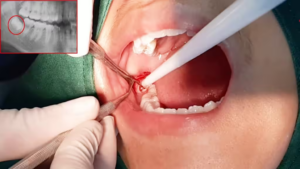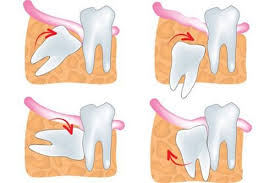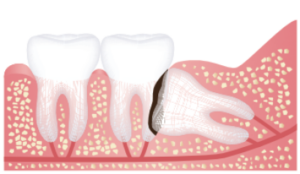Wisdom tooth extraction is one of the most common dental procedures, helping to remove impacted teeth that cause pain and affect surrounding teeth. However, if the process is not performed properly, it can lead to Dangerous complications when removing wisdom teeth. To understand more about this issue, let’s explore this article from Joy International Dental Clinic. Here, you will find essential information on how to prevent complications and ensure a safe, effective extraction process.
1. Does Wisdom Tooth Extraction Significantly Affect Your Health?

Wisdom tooth extraction is considered a minor surgical procedure in dentistry. However, certain precautions must be taken before undergoing the procedure. Any mishap during the process can affect oral health and slow down the healing process. In more severe cases, complications such as prolonged pain, infections, or damage to surrounding teeth may occur.
Therefore, understanding the procedure and properly preparing for it are crucial steps to ensure that the surgery is performed safely and effectively.
2. Factors That Can Lead to Wisdom Tooth Extraction Complications
2.1 Age Factor
Dentists recommend extracting wisdom teeth at a younger age since the recovery process tends to be faster. Younger individuals have softer bones and more elastic gum tissues, allowing for a smoother healing process. Conversely, in older individuals, the healing process may take longer, increasing the risk of complications.
2.2 Your Overall Health Condition
Your overall health plays a significant role in determining whether you are fit for wisdom tooth extraction. Individuals with underlying health conditions such as diabetes, heart disease, or blood clotting disorders need to take extra precautions. A weakened immune system can lead to prolonged healing times and increased difficulty in wound care.
2.3 The Position of Your Wisdom Tooth

The way a wisdom tooth grows varies from person to person. This factor significantly affects the complexity of the extraction. If the tooth erupts straight, it is relatively easy to remove. However, if it is impacted, grows at an angle, or is buried under the gums, the procedure becomes more challenging and requires an experienced dentist.
Additionally, if the wisdom tooth is pushing against the adjacent molar (tooth number 7) or is embedded deep in the jawbone, the extraction process becomes even more complicated, requiring advanced surgical skills.
2.4 Your Oral Health Condition
If you have existing dental issues such as gum disease, cavities, or infections before extraction, the risk of complications increases. Dentists usually recommend treating these conditions before the procedure to ensure the best possible outcome and minimize risks.
2.5 The Dental Clinic You Choose
The dentist’s expertise, advanced equipment, and strict sterilization protocols are critical in minimizing complications. Choosing a reputable and professional dental clinic ensures that your extraction procedure is carried out with high standards of safety and precision.
3. Common and Serious Complications of Wisdom Tooth Extraction
3.1 Painful complications when removing wisdom teeth

Post-extraction pain is normal; however, if the pain persists for several days and is accompanied by swelling or fever, it could indicate an infection.
3.2 Prolonged Bleeding
Normally, bleeding should stop a few hours after the procedure as a clot forms in the extraction site. If bleeding continues for more than 24 hours, seek immediate medical attention to prevent excessive blood loss.
3.3 Jaw Joint Injury

One of the most common complications is temporomandibular joint (TMJ) pain. This can happen if the extraction procedure is prolonged, requiring the patient to keep their mouth open for an extended period, which may strain the jaw joints.
3.4 Dry Socket (Alveolar Osteitis)
This occurs when the blood clot in the extraction site dissolves or fails to form properly, exposing the underlying bone. Dry socket causes intense pain and requires immediate dental intervention.
3.5 Jawbone Fracture
Although rare, jaw fractures can occur if the wisdom tooth is deeply embedded and firmly attached to the bone. This is why choosing an experienced dental professional is essential to minimize such risks.
3.6 Osteomyelitis (Bone Infection)
If the clinic does not maintain proper sterilization standards, bacteria can spread from the extraction site to the bone marrow, leading to osteomyelitis—a severe bone infection that requires immediate medical attention.
3.7 Damage to Adjacent Teeth

If the dentist lacks precision, the adjacent tooth (tooth number 7) may be affected during extraction. This can result in loosened or damaged teeth, leading to further dental complications.
3.8 Sinus Perforation
Wisdom teeth in the upper jaw are located near the sinus cavity. If not extracted properly, the sinus membrane can be perforated, leading to sinus infections and chronic discomfort.
4. How to Prevent Wisdom Tooth Extraction Complications
4.1 Choose a Reputable Dental Clinic
Not all clinics offer the same level of safety and expertise in performing wisdom tooth extractions. A well-equipped dental clinic with experienced dentists and a strict sterilization process can significantly reduce risks. Research thoroughly and read patient reviews before selecting a clinic.
4.2 Follow Pre- and Post-Operative Instructions
Proper preparation before and care after the extraction are crucial for a smooth recovery. Before the procedure, ensure you eat a nutritious meal, avoid stimulants like alcohol or caffeine, and inform your dentist about any health conditions. After the extraction, follow all post-operative care guidelines to protect the extraction site and promote healing. If you experience prolonged bleeding, swelling, or unusual pain, consult your dentist immediately.
4.3 Maintain a Healthy Diet and Rest Adequately
After the extraction, your body needs time to recover. It is essential to rest and avoid strenuous activities for the first 24 hours. A proper diet also plays a key role—opt for soft foods like soups, porridge, and smoothies to prevent irritation to the wound. Avoid spicy, hard, or excessively hot foods that could slow down the healing process. Staying hydrated and consuming nutrient-rich foods can also enhance recovery speed.
Conclusion
Joy International Dental Clinic has outlined the potential complications of wisdom tooth extraction and provided essential precautions to help ensure a safe procedure. We hope this information reassures you and helps you prepare effectively for your extraction. If you have any questions, feel free to leave a comment or contact our clinic for a personalized consultation.






